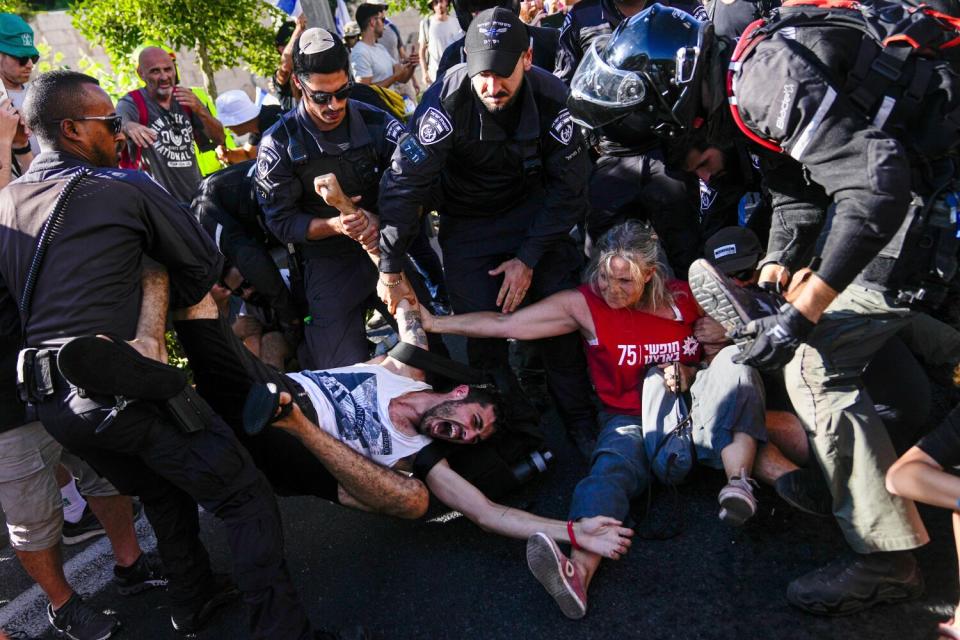Netanyahu ignores Biden — and masses of Israeli protesters — to step back from democracy

- Oops!Something went wrong.Please try again later.
- Oops!Something went wrong.Please try again later.
- Oops!Something went wrong.Please try again later.
In his speech to a joint session of the U.S. Congress last week, Israeli President Isaac Herzog invoked the word democracy, or a variation thereof, at least 17 times in praise of his country’s political system.
U.S. lawmakers jumped to their feet in steady applause nearly every time.
But at home, hundreds of thousands of Israelis are now living in deep fear that Israel, long heralded as the only democracy in the Middle East, will no longer be able to claim the title.
“We’re totally shocked — this is horrible,” said Naomi Sussmann, 59, a translator who was in the crowd of protesters outside the Israeli parliament in Jerusalem on Monday, hours after Prime Minister Benjamin Netanyahu and his right-wing government pushed through a law opponents believe will gut the power of Israel’s judiciary and destroy a central pillar of its democracy.
President Biden and other U.S. leaders have voiced objections to the law and urged the Israeli government to seek consensus as massive demonstrations continued to fill Israeli streets week after week.
Though Washington gives Israel billions of dollars for security each year, that aid is considered sacrosanct, giving U.S. officials little leverage. They acknowledged that the issue was ultimately a domestic Israeli matter. Netanyahu owes his seat in power to a coalition of ultranationalist lawmakers and is essentially captive to them.
Biden has expressed loyalty and admiration for Israel, for both political and personal reasons, but he also wants it to preserve the very democratic ideals that are the reason for much of the support it enjoys.
“It is unfortunate that the vote today took place with the slimmest possible majority,” White House spokeswoman Karine Jean-Pierre said Monday.
Read more: Longtime Israel backers in U.S. turn outraged critics — but Biden administration remains distant
As a form of pressure, Biden has broken with tradition and refused to issue a formal invitation to Netanyahu to visit the White House since his reelection late last year. Monday's White House statement made no mention of Netanyahu, instead expressing support for Herzog, in the ceremonial role of president, and Israeli officials seeking compromise.
The law, which limits the ability of the Supreme Court to overturn government decisions, has thrown Israel into unprecedented political crisis, sowed turmoil in its military, which generally opposes it, and smirched the nation's reputation abroad.

Proponents of the legislation are motivated by deep-seated resentment toward what they see as a liberal court. These include Jewish settlers who insist on building on West Bank lands claimed by Palestinians, and the ultra-religious haredim, who are worried about court decisions that threaten to cut their benefits, including heavy subsidies and a pass to avoid military service. Some critics say Netanyahu, who is on trial on corruption charges, believes weakening the judiciary helps his case.
The Biden administration “comes up against the hard calculus of the coalition which sees this move as crucial for amplifying its power," said David Makovsky, a former editor of the Jerusalem Post and fellow at the Washington Institute for Near East Policy. "I don't think any U.S. president could have stopped it."
That's despite the fact, Makovsky said, that Biden has the support of the majority of the Israeli public. "I've never seen a U.S. [president] withhold a White House invitation for seven months and have the Israeli public on his side," Makovsky said. "It defies political physics."
Netanyahu’s decision to ignore Biden could have other ramifications, such as chilling U.S. efforts to broker an Israeli-Saudi diplomatic breakthrough.
“Israel has always considered itself a liberal democracy," which is "an important distinguishing factor between it and its neighbors,” said Yuval Shany, a Hebrew University law professor and senior fellow at the Israel Democracy Institute. “The fact that they're willing to go to such an extent, to basically jeopardize the military, the economy, society, and also create a rupture with international communities, and specifically with Washington, this is quite remarkable and is extreme in and of itself.”

The characterization of Israel as a democracy has always rung hollow for the Palestinians living under Israeli military occupation for nearly half a century — a group that now numbers 5 million. The political picture in Israel now is also bad news for them. Palestinians living in the West Bank and Gaza Strip have long sought an independent state, and the Supreme Court served as a last resort for some seeking to prevent their property from being seized by Israelis.
There is wide expectation that the already numerous settlements, which much of the world considers illegal, will now expand even as deadly violence between Israelis and Palestinians has soared in recent months.
In a brief televised address after the vote by the Knesset, or parliament, Netanyahu sought to portray his action as “realizing the will of the voter … the essence of democracy.”
The vote came against an extraordinary backdrop: tens of thousands of Israeli protesters in the streets of Jerusalem, Tel Aviv and other cities, defying water-cannon blasts and horseback-mounted police officers while raising fierce cries of “Shame!”
As mass protests entered a 29th week, demonstrators lay on the ground to block traffic, formed a human chain stretching from the Western Wall to downtown Jerusalem, and erected a sprawling tent city near the Knesset. Authorities took the virtually unprecedented step of deploying “skunk water” — a foul-smelling liquid sometimes sprayed at Palestinian protesters in the occupied West Bank — against some of the Israeli demonstrators. By evening the unrest spread into the heart of Tel Aviv, the country’s commercial capital.
“All of our fears became real today,” said Rivka Calderon, a retired museum archivist from Tel Aviv who was protesting in downtown Tel Aviv on Monday night. “Today was not an easy protest, but I’m looking for that feeling of being together, that’s why I came back out tonight.”
Calderon said she was also worried about the damage done to the wider society, evidenced by violence between the two sides on Monday night, including a car ramming attack that left three anti-reform protesters injured, and shots fired in the air at a protest in southern Israel.
“There’s a tear that is so deep in our society, and that’s not healthy, this enormous gap between the two sides that is getting deeper,” she said.
Thousands of Israeli military-age men have said they would not report for reserve duty if the legislation moved ahead, including hundreds of Air Force reservists who threatened to withhold their participation in mandatory weekly readiness exercises.
“I can’t even say these words out loud, that we’re not a democratic country,” said Eyal Yaffe, the leader of a group of veterans of the 1973 Yom Kippur War. The group created a life-sized version of the tank Yaffe fought in 50 years ago and has been taking it to protests all over the country. He was in the reserves until leaving the army altogether to join the protests.
“I never thought that in my life I’d leave the army under my own decision, when I still have things to do there,” he said. “I love the army and I love to serve the country, but I can’t continue serving a country that’s going to be a dictatorship.”
Read more: Israel pledges fair treatment for all U.S. travelers in bid for visa-free trips
Israel’s largest labor federation, the Histadrut, said it would consider holding a general strike, and the unrest shuttered hundreds of shops and businesses, even entire large shopping malls.
As Netanyahu’s political allies posed for triumphant selfies in the Knesset, commentators warned of a staggering and perhaps irreparable blow to the country’s democratic traditions.
Veteran editor and commentator David Horowitz, writing for the Times of Israel website, said Netanyahu and his government had “set in motion a process that risks tearing apart the State of Israel.”
Speaking to Britain's Channel Four, former Prime Minister Ehud Olmert said: “We are going into a civil war now.”
Adding to the sense of crisis and drama, the 73-year-old Netanyahu pushed through the legislation even while recovering from the implanting of a pacemaker over the weekend.
In what Netanyahu’s critics saw as an ominous portent, the hard-line national security minister, Itamar Ben Gvir, said Monday’s legislative action was “only the beginning.”
“There are many more laws we need to pass as part of the judicial overhaul,” he declared.
Staff writers Wilkinson and King reported from Washington and special correspondent Lidman from Tel Aviv. Staff writer Owen Tucker-Smith in Washington contributed to this report.
Get the best of the Los Angeles Times’ politics coverage with the Essential Politics newsletter.
This story originally appeared in Los Angeles Times.

